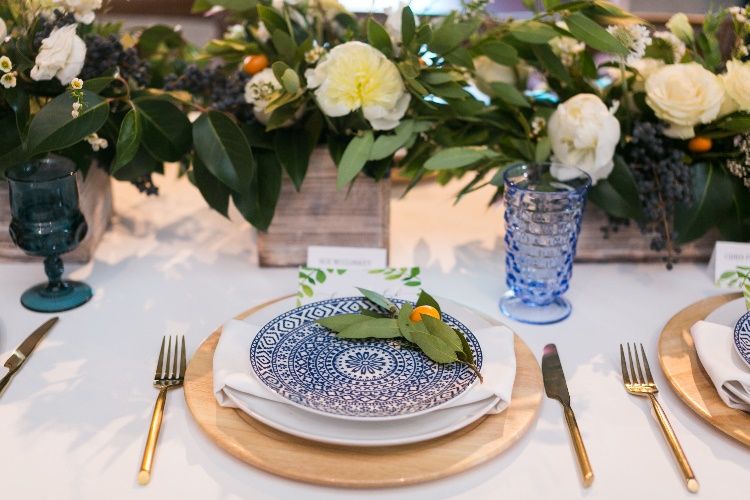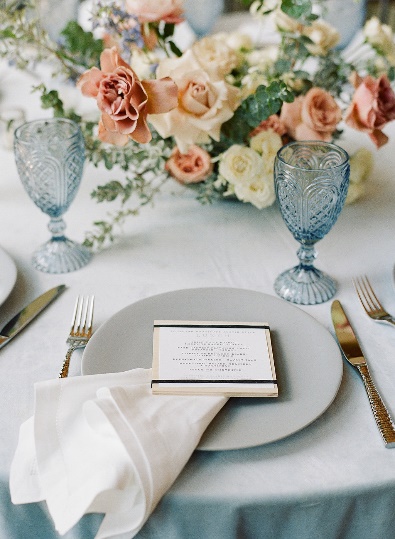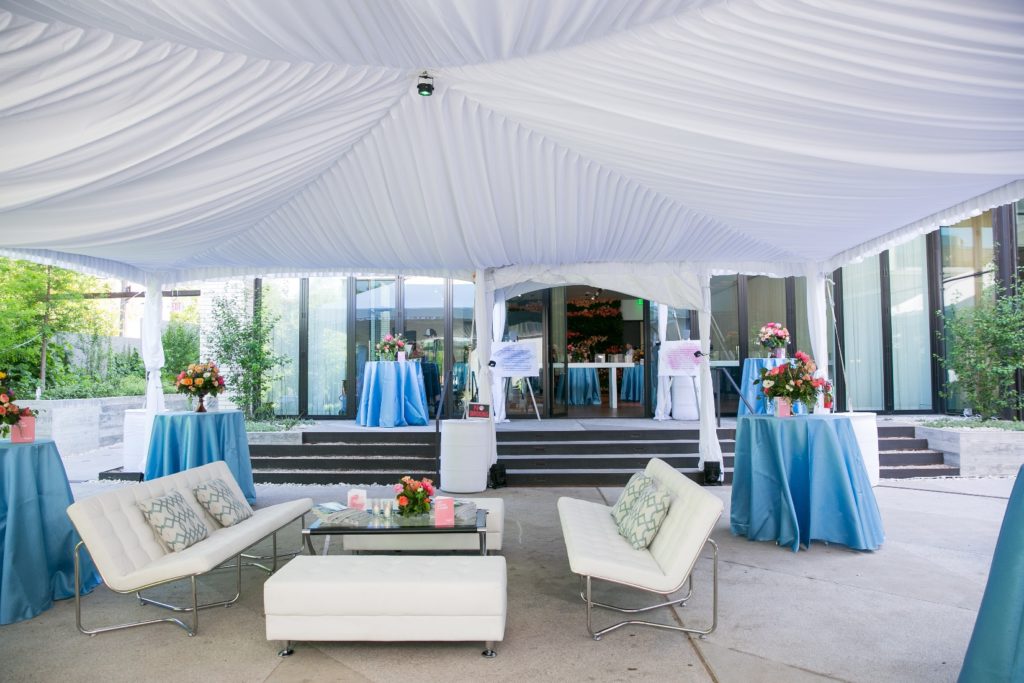
Every Season is Wedding Season
Article By: Party Time Rentals
Winter, spring, summer or fall – every season is wedding season, especially in Texas. Regardless of the time of year you choose for exchanging your vows and saying “I Do”, you’ll want to consider seasonality in making your wedding plans. Every season has its own unique advantages and some obvious challenges, so here are a few variables to consider as you and make that important “time of year” decision.
Let’s begin by exploring the two least popular wedding seasons, winter (from around December 20th through around March 20th each year) and, at the opposite end of the seasonal spectrum, summer (beginning around the 20th of June and ending around the 20th of September). Choosing a wedding day in either of these less popular wedding seasons may be a good strategy, particularly if saving money and staying on a budget is important to you.
 In January, February (with the exception of Valentine’s Day) and into March, particularly in cooler climates, many venues offer discounted or non-peak rates. The venue savings, along with discounts from other wedding professionals (planners, caterers, florists, photographers, entertainment, etc.) can be significant. Similar summer savings are available in warmer climate states (like Texas) where July and August temperatures often reach triple digits and the wedding will be held partially or completely outdoors.
In January, February (with the exception of Valentine’s Day) and into March, particularly in cooler climates, many venues offer discounted or non-peak rates. The venue savings, along with discounts from other wedding professionals (planners, caterers, florists, photographers, entertainment, etc.) can be significant. Similar summer savings are available in warmer climate states (like Texas) where July and August temperatures often reach triple digits and the wedding will be held partially or completely outdoors.
Keep in mind, as you think about your reception, that the season will also partially dictate your available and affordable décor options. A winter wedding can be stunning in shades of white, silver and blue, but you may have difficulty obtaining fresh florals. Many winter weddings feature fewer flowers and rely more heavily on metallic elements or seasonal greenery and lots of candle light. A well- designed winter table-scape and décor plan can be not only memorable, but relatively inexpensive (by comparison to fresh flowers).
 Summer offers a plethora of décor choices, and there’s almost no color pallet that doesn’t work for summer nuptials. Plants and florals are more economical and readily available. Disadvantages to the summer season surround the sometimes-unrelenting heat and outdoor pests (bees, flies, wasps and other unwelcome wedding guests), but these issues will have little or no impact if both your ceremony and reception will be held indoors.
Summer offers a plethora of décor choices, and there’s almost no color pallet that doesn’t work for summer nuptials. Plants and florals are more economical and readily available. Disadvantages to the summer season surround the sometimes-unrelenting heat and outdoor pests (bees, flies, wasps and other unwelcome wedding guests), but these issues will have little or no impact if both your ceremony and reception will be held indoors.
Travel is an important consideration for most couples, both from the standpoint of out-of-town family, wedding-party members and guests, and in honeymoon planning as well. Winter travel is always dicey, especially if the maid of honor is coming from Minnesota or the bride’s mom and dad live in Maine. Summer travel, while more reliable, is also more expensive. Your honeymoon (unless you’re traveling to a tropical destination) is likely to be less expensive in February and August than it will be in May or October. Unlike winter and its always threatening weather delays, summer travel is relatively simple and uncomplicated – but more costly. During the summer months, you’ll also have to “compete” for airplane, hotel and destination attractions with vacationing families.
 Spring and fall are far and away the most popular wedding seasons. June dominates spring and late September through October are the most popular times to wed in the fall. According to The Knot’s 2016 (national) wedding statistics, 16% of couples choose to get married in October and 16% in September, with June in third place at 13%. You’ll be in good company if you decide to marry in either of peak season, but the fact that you’ll be competing with so many other couples for those top ten magical Saturdays merits careful consideration.
Spring and fall are far and away the most popular wedding seasons. June dominates spring and late September through October are the most popular times to wed in the fall. According to The Knot’s 2016 (national) wedding statistics, 16% of couples choose to get married in October and 16% in September, with June in third place at 13%. You’ll be in good company if you decide to marry in either of peak season, but the fact that you’ll be competing with so many other couples for those top ten magical Saturdays merits careful consideration.
Spring or fall wedding dates negate virtually every economic advantage of choosing a winter or summer wedding day, with the possible exception of travel-related costs. You’ll have fewer Saturday options and limited choices for Fridays and Sundays in the most popular months of the year. You may have more difficulty booking the best wedding professionals for your special spring or fall day, since the most popular wedding pros are booked well in advance – and at prices that reflect the law of supply and demand.
Despite the economics, you may still decide that the promise, or possibility of a seasonally “perfect” day is the right choice for you. Perhaps the newly green grass and trees in full bloom on a warm April day really is worth the price. Or a cool, crisp October Saturday, with all the rich, bold colors of the season may simply be irresistible. Spring and fall weddings, when the elements cooperate, can indeed be perfect. From a décor perspective, these seasonal choices inspire and excite, and crafting the perfect spring or Fall Ceremony and Reception is truly a delight. The vivid greens and floral tones in a spring pallet or the rich, warm colors of fall can create the perfect marital backdrop.
 Here in Texas, the flip side of a perfect weather scenario should be considered when a spring or fall wedding plan is made. Tornados – torrential rains – floods, while perhaps uncommon, do occur more frequently in spring than in any other season. Statistically, May, June, October and September are Texas’ rainiest months. So if you have your heart set on being outdoors in these months, make sure you have a practical and affordable “bad weather back up” plan that includes both tenting (to keep you and your guests dry) and climate control. Wind-driven rain may require that tent walls be installed, and a walled tent needs both air circulation and supplemental lighting. Working with a rental or event planning professional to put a good plan B is in place is the best insurance that you won’t need it. And don’t forget that tenting is also a great source of shade. A well-dressed tent can be an asset to any outdoor event.
Here in Texas, the flip side of a perfect weather scenario should be considered when a spring or fall wedding plan is made. Tornados – torrential rains – floods, while perhaps uncommon, do occur more frequently in spring than in any other season. Statistically, May, June, October and September are Texas’ rainiest months. So if you have your heart set on being outdoors in these months, make sure you have a practical and affordable “bad weather back up” plan that includes both tenting (to keep you and your guests dry) and climate control. Wind-driven rain may require that tent walls be installed, and a walled tent needs both air circulation and supplemental lighting. Working with a rental or event planning professional to put a good plan B is in place is the best insurance that you won’t need it. And don’t forget that tenting is also a great source of shade. A well-dressed tent can be an asset to any outdoor event.
Finally, whatever wedding season you choose, remember you’ll always be celebrating your Wedding Anniversary at that time of year as well. So all of the considerations that impact your decision for marrying in Winter, Spring, Summer or Fall will be in play for your 10th, 25th and, if you’re fortunate, 50th year of wedded bliss. So choose wisely and well . . . it’s a date that you’ll be celebrating for years to come.